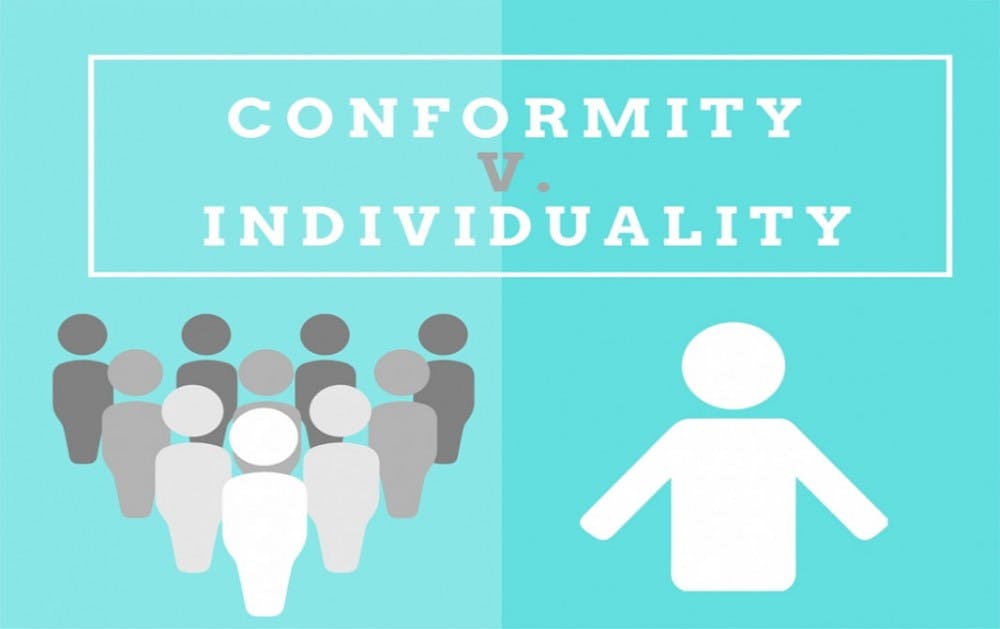An overload of 'new' can impact a student when they're first adjusting to college life. A new school, new bedroom and new people at every corner can be overwhelming for students since everything they once knew is now different.
However, having a sense of self can make the college transition process less difficult, and conforming can inhibit a student's individuality in college.
It may seem that conforming to on-brand or the trendy aspects of college reflect a personality or identity that is shared, when in reality, it's better for students to identify themselves rather than have someone else define them.
Students have to differentiate who they are from what trends they subscribe to. Without this distinction, it can become easy to concern oneself with the opinions of others and the negative collective thinking of their peers.
In a study performed by the Journal of Youth and Adolescence, researchers found that "peer pressure and peer conformity measures were stronger predictors of risk behavior, such as substance use, delinquency, dating attitudes, sexual behavior and poor school performance, than was popularity, general conformity or dysphoria."
Examples of groupthink, or "mob-mentality," are prominent on college campuses, although many experts discourage students from "falling into the vice of conformism" because they are looking for an opportunity to feel accepted.
Groupthink, in these situations, creates an illusion that what is wrong is right, as long as you're not the only one doing it. This can be found in arrest rates, political views and mental health statistics, according to Joshua Kane, an ASU professor of sociology.
Read More: College students often fall victim to political groupthink
By engaging in more diverse communities and exposing oneself to new ideas, students can find out who they are and where they fit.
Conformity is often misleading and obnoxious. It is normally based on some of the worst impulses one might have as a young adult, and often divides the students best interests from the approval of their inner circle.
Kane said that this is all a matter of groupthink, which is an effect of the need to conform.
“The need to belong when nobody knows their identity can turn very, very dangerous,” he said. “The way to avoid that is to avoid the groupthink. Figure out who you are by creating a community of real people with real connection, real caring and real love. Don’t try to fit in – try to find people who love you for you.”
Off-campus parties, music tastes and bad habits are all instances of conformity. These instances are not the most effective route to self discovery.
"Because there are no clear indicators of identity, (people are) conforming for the sake of conforming, and many times that takes the path of doing something bad," Kane said. "How can we prove that we're conforming to this group and how can we prove that this group is important to us?"
Take the recent influx of e-cigarette use within just the past year, for example. The National Adult Tobacco Survey found in preliminary data yet to be posted but shared by the Washington Post, that there has been a 75 percent increase in the use of e-cigarettes in teenagers in the last year.
It is easy to lose one's sense of identity among peer pressure. Though this may seem simple, people often choose to spend time with those who have similar interests but different morals, consequently neglecting their own morals.
Students have to stop searching for acceptance from others and instead work on accepting themselves.
Students exercise their individuality because conformity, in all forms, is the death of individuality.
Reach the columnist at sirich@asu.edu or follow @sydneyirich on Twitter.
Editor’s note: The opinions presented in this column are the author’s and do not imply any endorsement from The State Press or its editors.
Want to join the conversation? Send an email to opiniondesk.statepress@gmail.com. Keep letters under 500 words and be sure to include your university affiliation. Anonymity will not be granted.
Like The State Press on Facebook and follow @statepress on Twitter.




